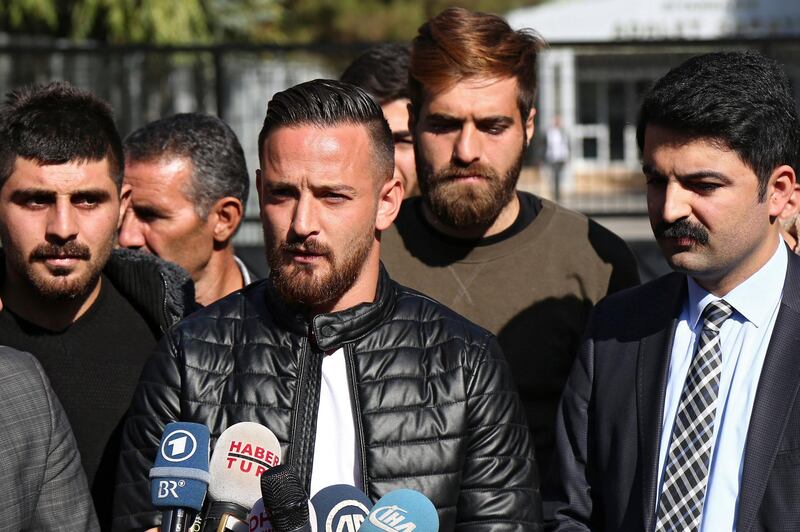A German-Kurdish footballer who was shot at while driving in Germany on Sunday says he was attacked for criticising the Turkish government and supporting Kurdish separatism.
Deniz Naki, 28, was driving his SUV on a motorway near the town of Düren when unknown assailants opened fire from a black van.
Two bullets hit the car, one smashed into a side window and another became lodged in the chassis above the wheel - he was unhurt.
Mr Naki was driving on a slow lane at 11pm when the vehicle approached his car from the adjacent lane and shots were fired, he recalled. “I immediately ducked and drove onto the hard shoulder.”
The van drove off and Mr Naki called the police.
“I could have died, it was close — I was afraid for my life,” Mr Naki, who frequently receives death threats on social media because of his pro-Kurdish stance, told Die Welt newspaper. “I always knew that something like that could happen. But I never expected it to happen in Germany.”
Mr Naki, who resides in Turkey, said he was targeted because of his criticism of Turkish president Recep Tayyip Erdoğan.
“I assume it was an MIT (Turkish National Intelligence Organisation) agent or someone else who doesn’t like my political stance,” he said.
“We’re investigating in all directions,” said Katja Schlenkermann-Pitts, a spokeswoman for the prosecutor’s office in Aachen. “A politically motivated crime cannot be ruled out.”
Some consider Mr Naki an enemy of the Turkish state because of his support for the Kurdistan Workers' Party (PKK) - a Kurdish separatist organisation, recognised as a terrorist group by the United States.
In 2016 Mr Naki was charged with inciting hatred and hostility, the case was dropped in November that year. In April 2017 he was given an 18-month suspended jail sentence for "terrorist propaganda" in support of the Kurdish group.
_______________
Read more:
Erdogan threatens action against US-allied Syrian Kurd militia
Turkish policeman killed, 9 wounded in raid on PKK
Turkey summons German envoy over 'pro-PKK' rally in Cologne
_______________
Mr Naki captains the third-division club Amed SK in Diyarbakir, the unofficial capital of Turkey’s predominantly Kurdish southeast. Mr Naki and his teammates are celebrated by Kurds as stars of the Kurdish separatist cause, but they are also reviled by many Turks.
When the team travels for work, crowds chant abuse and hurl objects at them during their matches. Last summer, Mr Naki was physically attacked by a spectator.
Following last year's suspended jail sentence and an increase in threatening messages, Mr Naki says he was advised by friends to move back to Germany, where his skills once earned him a place in the national under-21 team and where he played for Hamburg club St. Pauli in the Bundesliga.
But the team captain says he refuses to leave Turkey, telling German newspaper Welt am Sonntag last July that leaving would be an admission of guilt. “But I didn’t do anything wrong. And I told the court that.”
He is now under police protection in an undisclosed location. His lawyer, Soran Haldi Mizrak, said: “there’s no safety for Deniz in Germany. It’s evidently safer for him in Diyarbakir.”
Mr. Naki’s father, Hasan Naki, spent time in prison for opposing the Turkish military and fled to Germany upon his release in the 1970s. He continued to support the Kurdish separatist cause from there. “I was six when I accompanied my father to my first Kurdish demonstration,” Mr Naki said.
He has delayed his return to Turkey for a few days to assist the police in their investigation.
Germany and Turkey are working to mend relations following a host of disputes, including a row over president Erdogan’s crackdown in the wake of the 2016 coup attempt. Turkey has repeatedly accused Germany of sheltering PKK supporters.
Hundreds of militants, members of the security forces and civilians have been killed in southeast Turkey since the collapse of a ceasefire between the Turkish army and the PKK in 2015. The conflict has killed some 40,000 people since 1984.
Sahra Wagenknecht, parliamentary leader of the Left party, said that Berlin should investigate whether "Turkish death squads are active in Germany" and demanded decisive action against "criminal activities by Erdogan supporters in Germany.”






